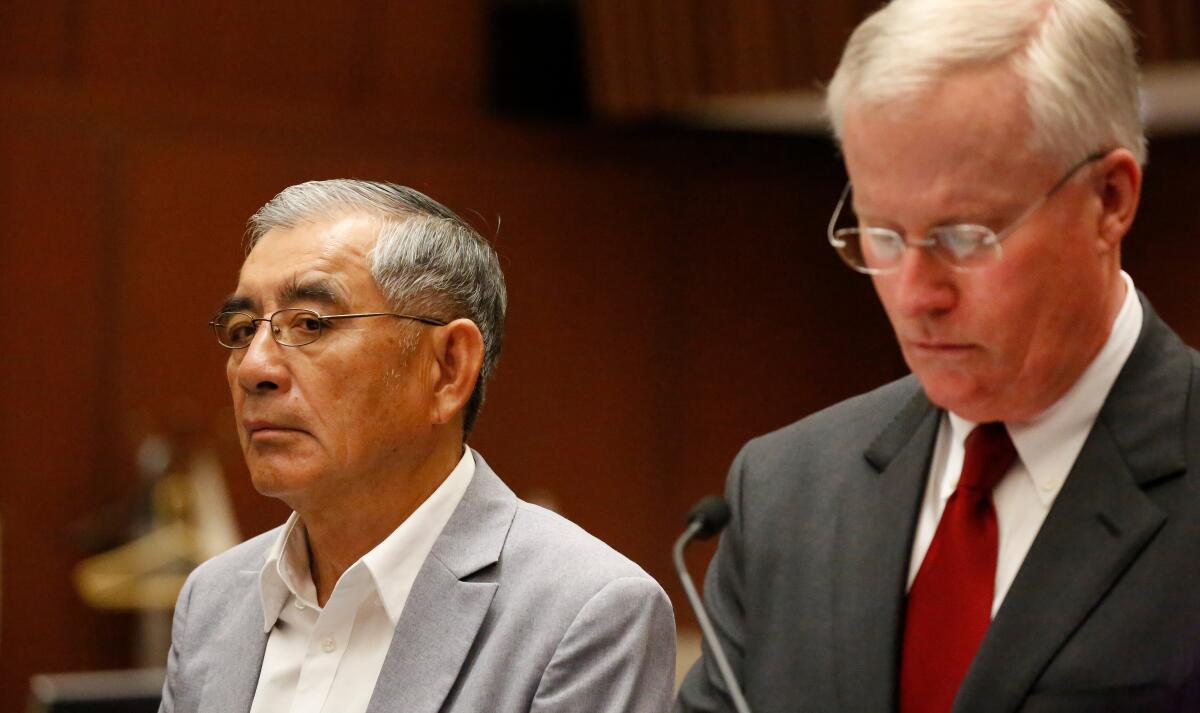L.A. real estate developer accused of 444 violations of campaign fundraising laws

- Share via
The Los Angeles Ethics Commission has accused real estate developer Samuel Leung of committing 444 violations of the city’s campaign finance laws, including those that prohibit the laundering of campaign money.
The agency, in a filing released Friday, said it had determined that “probable cause exists” to believe that between 2009 and 2015, Leung reimbursed campaign donors in violation of city law and exceeded the city’s limits for political contributions.
Leung was at the center of a Times investigation in 2016 that revealed a sprawling network of people and companies tied to him had made political donations totaling more than $600,000 while city leaders were reviewing his proposed 352-unit apartment project, then known as Sea Breeze.
When reporters from The Times contacted those donors, some denied making the contributions or said they didn’t remember doing so.
The Times reported that the “pattern of donations from unlikely sources, some of whom profess to have no knowledge of contributions made in their name, suggests an effort to bypass campaign finance laws designed to make political giving transparent to the public.”
Sea Breeze, located in L.A.’s Harbor Gateway neighborhood, was approved by the City Council in 2015. It opened several years ago under the new name Seacrest.
The Times’ coverage sparked investigations by both the Ethics Commission and the L.A. County District Attorney’s Office, which filed a case against Leung. In 2020, he pleaded guilty to conspiring to commit campaign money laundering. He was sentenced to five years of probation and 500 hours of community service.
At the time, Leung also agreed to pay a yet-to-be-determined amount of restitution to the city.
In the filing released Friday, Ethics Commission officials said that their probe began with the web of contributors identified by The Times and expanded to include other political donors.
The commission said it had found “extensive evidence” that at least 66 donors had made contributions that “were directly or indirectly reimbursed, or outright paid for” by Leung. More than 400 contributions to political committees created by or for local politicians were attributed to those donors, according to the filing released Friday.
Los Angeles prohibits donors from making “assumed name” contributions — donations attributed to one person but actually funded by someone else. That law is designed to prevent contributors from circumventing the city’s limits on political donations. It also provides clarity on the true source of political contributions.
The Ethics Commission filing states that Leung “reimbursed or caused the reimbursement” of the more than 400 contributions to political committees — both campaigns and officeholder accounts — that exceeded contribution limits by a total of more than $210,000.
“The evidence shows that ... Leung directly solicited and reimbursed contributions from family, certain individuals who worked for him, and family members of the individuals who worked for him,” the commission said in its 148-page filing, which detailed the donations in depth.
A lawyer for Leung did not immediately respond to requests for comment.
Leung also was involved in reimbursing eight contributions totaling $80,000 to an independent expenditure committee that had no limit on the size of each donation it received, according to the accusation.
In the coming weeks, the five-member Ethics Commission will select a hearing officer for an administrative hearing. The commissioners will then determine whether the alleged violations occurred and, if so, what Leung’s penalty should be.
According to the commission, the maximum penalty is either $5,000 per violation or three times the amount of money that was improperly contributed or reported, whichever is greater.
More to Read
Sign up for Essential California
The most important California stories and recommendations in your inbox every morning.
You may occasionally receive promotional content from the Los Angeles Times.











